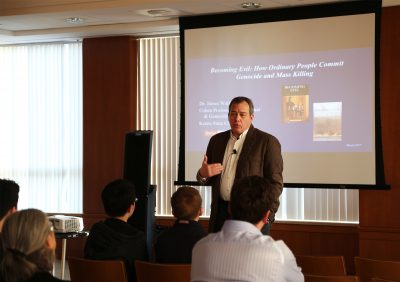
James Waller, a professor of Holocaust and Genocide Studies at Keene State College in New Hampshire, presented his research on the psychology of perpetrators of genocide and mass killings to approximately 50 students and staff at Boston University’s Elie Wiesel Center for Jewish Studies on Tuesday evening.
The lecture, titled “Becoming Evil: How Ordinary People Commit Genocide and Mass Killing,” was the second event to kick off BU’s new Holocaust and Genocide Studies minor program. Keene State is still the only undergraduate university in the United States to offer Holocaust and Genocide Studies as a major, Waller said.
Nancy Harrowitz, a professor at BU and the lecture’s organizer, introduced Waller by speaking about how Keene State’s Cohen Center for Holocaust and Genocide Studies inspired the creation of the minor program at BU.
“Dr. James Waller is a role model for our program in two respects: his deep study of genocide and genocide prevention, as well as the necessity of policymaking in order to respond to warning signs about genocide,” Harrowitz said.
Waller said he has interviewed over 200 alleged and confirmed perpetrators of mass killings in countries like Argentina, Rwanda and Guatemala in order to better understand the perpetrator’s behavior. Waller has published two books on the subject and frequently travels to countries where mass killings have taken place, educating world leaders and army generals about the warning signs of genocide.
Waller said the perpetrators of these atrocities often aren’t evil or monsters as people tend to believe, but rather ordinary members of society. He explained this by describing a visit he made to the Auschwitz-Birkenau concentration camp several years ago
“There was a row of houses that stood outside Birkenau,” Waller said. “These were family houses. The wives and children waited for their husbands and fathers who did what they did in Birkenau and crossed the street to come home. I can assume they read stories to their children, tucked their children into bed … And that’s the most fascinating psychological question. What are the emotional gymnastics that someone goes through to do this type of work and then maintain some semblance of an ordinary, normal, loving, caring life?”
Waller said in order to understand history, people need to step into the shoes of perpetrators of these genocides, although that comes with the danger of developing feelings of empathy for the killer.
“How did they cope? What changes do they experience?” Waller asked. “Maybe we start to empathize to such a degree by stepping into their shoes that we lose all capacity for moral judgment. We lose all capacity for moral condemnation because now it becomes a little bit clearer to us. As someone who works in issues of genocide prevention, if we don’t ask this question, we have no hopes of stopping it.”
Several students and staff who went to the lecture said they were intrigued by Waller’s conclusion that those who commit mass killings are normal people.
Mildred Basker-Seigel, a lecturer in Spanish at BU, said Waller’s discussion made her think about the social and psychological factors that cause humans to become evil.
“I’m fascinated by this professor’s research about how ‘ordinary’ these perpetrators seem to be and how this phenomenon can happen in societies where there is a blind trust in authority,” Basker-Seigel said. “There’s no room for the individual, and if you are part of that, you are going to get swept along with the current.”
She said she’s excited by the addition of the Holocaust and Genocide Studies minor at BU.
“It is a very wonderful thing for BU to have a minor in Genocide Studies as it allows students to analyze its causes and effects and to use their knowledge to educate others in the future,” Basker-Seigel said.
Matthew Guenoun, a junior in the College of Arts and Sciences, said he came to the presentation because he is minoring in Holocaust and Genocide Studies.
“Growing up, I’ve had a close relationship with my grandmother, and she’s a Holocaust survivor,” Guenoun said. “She’s very influential in my life, so it’s something that I care deeply about. I think it’s good to explore history and learn about what went on to prevent it in the future.”
Bruna Pino, a CAS senior, said she found Dr. Waller’s explanation of the psychological characteristics of perpetrators to be most interesting.
“I kind of had the sense that you can argue that perpetrators are ordinary people, but when he started to delve deeper and break it down into morality, and ‘we follow the group,’ and ‘we want to be the best of the group,’ I thought that was very interesting,” Pino said.
Pino said she might have pursued a Holocaust and Genocide Studies minor if she had known about the program earlier.
“I think it’s something that should be available to students and it should be better marketed to students because honestly, I’m a senior, and up until today I didn’t know it existed, but I think it’s very important,” Pino said.























































































































